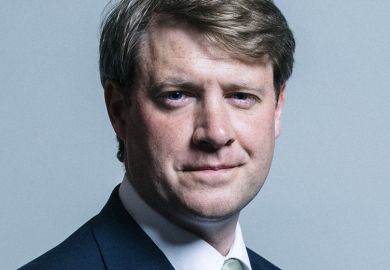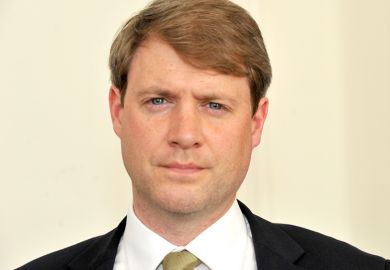What is going on inside government as the post-18 education review continues?
There is some useful insight in new universities minister Chris Skidmore’s interview with Times Higher Education, published today. He seeks to reassure a panicked sector about his stances on some of the key issues, but also offers realism about the limits of what he can do.
As a starting point, he stressed that the review reports into the prime minister, chancellor and education secretary and that a “cross-government” response will follow the review panel’s report.
Given these facts, the universities minister is, obviously, not going to be in the driving seat. Skidmore said that he would work to ensure any major changes are “graduated” – which offers the prospect of mitigation for universities in fear of a fees/funding cut, but nothing more. The big question – the extent and nature of any direct funding that the Treasury will allocate to universities to replace lost fee income – remains one not discussed in public.
But there are certain tactical positions that the universities minister can take up. Skidmore’s call for the government to consult following the panel report aims to reassure the sector. Without such consultation, less sympathetic/downright hostile forces in government (in No 10 or the Treasury) will seize the agenda. The Treasury, it is thought, wants the report to be delayed so that it can be considered as part of the spending review – in which case there would be no consultation.
What do the hostile forces think? Nick Timothy – the former adviser to Theresa May who many think is still a key influence on her – has argued that increased numbers of graduates have brought “no improvement in Britain’s productivity” and that “certain degree subjects offer no return on investment”. The recent report on student loans from the Onward thinktank, led by figures with strong Number 10 and Treasury links, conducted polling which found that “44 per cent of people believe that ‘there are too many students going to university’”. And the report argued that institutional courses deemed “low value” on the basis of graduate earnings data “should be gradually phased out”.
With these ideas swirling around government (and no doubt inside it too), it is significant that Skidmore defended the expansion of higher education. “I’m a universities minister who believes that there aren’t too many people at university,” he said. And he criticised the idea of a minimum grade threshold (which the review panel has looked at as an option to limit student numbers).
He also said that graduate earnings figures should not be used without understanding their context – most importantly, the huge variation in earnings by region. Some vice-chancellors fear that restricting loan access for courses deemed the worst performers on graduate earnings data, as per the Onward report, has been considered by the review as another way to limit student numbers.
Another long-running theory is that the Treasury will push for higher funding for STEM subjects (and lower funding for the rest), to direct students towards those courses. So it was interesting to hear Skidmore say that “arts and humanities are equally critically important to sciences and I’ll be working to make that case”.
But Skidmore was not advocating a no-change position – he referred to the “positive and progressive impacts about why this post-18 review is happening”. He talked a lot about the need to join up HE and FE and to consider whether we should be thinking of HE as something that happens at 18.
If the government wants to lower the cost of HE, having more students start out in FE with the opportunity to subsequently transfer their credits onto university degrees (possibly later in life when they are living at home or working, without the need for maintenance support) would be a clear, if logistically challenging, option.
More generally, Skidmore was keen to emphasise his background as a historian (and a former part-time lecturer at the University of Bristol) and to suggest that this puts his focus on evidence.
On that score, it was notable that he directly contradicted the aggressive stance on campus free speech taken by his predecessor, Sam Gyimah. Perhaps we may return to those halcyon days when universities ministers did not risk jeopardising the public and international standing of UK universities on the basis of non-existent evidence, all in eager pursuit of easy headlines in the Mail and Telegraph to feed their ambitions.
In terms of marks for his ministerial work so far, Skidmore has already offered more clarity than his predecessor on the review process and publicly staked out some positions that he wants to defend. And if you can hear one side of a conversation, you generally get a decent idea of what the other side is talking about.
John Morgan is deputy news editor at Times Higher Education.
Register to continue
Why register?
- Registration is free and only takes a moment
- Once registered, you can read 3 articles a month
- Sign up for our newsletter
Subscribe
Or subscribe for unlimited access to:
- Unlimited access to news, views, insights & reviews
- Digital editions
- Digital access to THE’s university and college rankings analysis
Already registered or a current subscriber?




